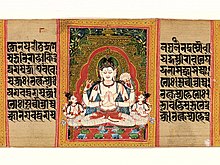Talk:Gouache
| This It is of interest to the following WikiProjects: | ||||||||
| ||||||||
Poorly written, needs radical editing
[edit]For example, ""En plein air" paintings take advantage of this, as do the works of J. M. W. Turner." - what does this MEAN? Are Turner's works not plein air but still take advantage of these characteristics? — Preceding unsigned comment added by 2.101.24.181 (talk) 21:56, 10 May 2018 (UTC)
Clean up
[edit]In the clean up, I removed the gum arabic mention. My ref didn't have it, but some other (on line) ones do. I'll put it back in when I find a dead-tree ref. I also removed the "illustrated manuscripts (country of origin unknown)" as I couldn't find a ref to support it, and think it may have meant illuminated manuscripts anyway. brenneman(t)(c) 06:52, 17 January 2006 (UTC)
Missing van Gogh
[edit]What was wrong with the van Gogh? http://en.wiki.x.io/wiki/Image:Vincent_van_Gogh_-_Corridor_in_the_Asylum.JPG —Preceding unsigned comment added by 71.191.9.229 (talk) 01:07, 10 February 2008 (UTC)
I didnt remove it, but considering this is article is about the medium.. I think it's better to have pictures that actually displays good technique, van goghs just famous because of the story behind it - not the use of gouache. Mlaoxve (talk) 04:33, 28 February 2008 (UTC)
I thought it was a good painting. But yeah, the article's about the medium. —Preceding unsigned comment added by 71.191.9.2 (talk) 06:13, 9 March 2008 (UTC)
Examples of gouaches diluted with rainfall, Coca-Cola, etc.
[edit]From the intro:
There are examples of gouaches diluted with rainfall, as well as very unusual examples with things other than water, such as Coca-Cola and Diet Coke.
The question I am asking, are their notable examples of it being diluted by these materials? The examples listed are just random works. If there are no notable examples, it hardly deserves to be mentioned in the article71.190.182.22 (talk) 18:19, 26 July 2010 (UTC)
I'm in agreement, these mentions are not relevant enough to the article to warrant inclusion Billfruge (talk) 15:43, 6 February 2011 (UTC)
Proposed restructure
[edit]I'd like to move the bits around a little bit and propose the following structure. - Aaron Brenneman (talk) 10:10, 10 July 2011 (UTC)
1 Usage
2 History
2.1 Earliest use, 14th to 16th century
2.2 Height, 18th and 19th century
2.3 Modern day
3 Composition and Manufacture
4 Prominent use
4.1 Artist
4.2 Works
5 See also
6 References
7 External links
- I did a little restructure, mostly lead, and put "description" first to match encyclopedic style. Intro is from (several) dictionaries and can always be ref'ed if needed. Fountains of Bryn Mawr (talk) 16:53, 18 March 2012 (UTC)
body color?
[edit]I'm curious why it's also called body color, but the article doesn't mention it? anybody know? 74.73.179.172 (talk) 18:52, 22 January 2016 (UTC) I just googled and found this at http://www.handprint.com/HP/WCL/pigmt7.html but I'm not knowledgeable enough to add it into this article:
- The method of mixing concentrated watercolor pigments with a vehicle that is made with fish gelatin (isinglass jelly) or animal gelatin (size) — without the addition of any white pigment — is traditionally called bodycolor (or distemper in England). However, the two terms are sometimes confused or used interchangeably, both in historical writings and current usage: some "designer's gouache" paints are made with concentrated pure pigment in a watercolor vehicle, without any added white pigment.
--- What 'two terms'? This makes no sense. — Preceding unsigned comment added by 2.101.24.181 (talk) 21:57, 10 May 2018 (UTC)
>>>Age
[edit]"Gouache has a considerable history, going back over 600 years."

Are you sure it's that new? Have a look at this image. According to the caption, it dates from the early 12th century, and the medium is "opaque watercolour on palm leaf". Isn't "opaque watercolour" another way of saying "gouache"? The article says so. Its origin in the early 12th century would make it roughly 900 years old, making gouache at least 1½ times as old as the article currently suggests.
Comments? Kelisi (talk) 16:51, 9 September 2020 (UTC)
- You didn't get as far down as the history section then? Lead changed. Johnbod (talk) 17:35, 9 September 2020 (UTC)
- No, I guess I expect an article to be coherently written, but I forgot that it often isn't when it's a cooperative project. Kelisi (talk) 04:05, 11 September 2020 (UTC)
- You know, though, if "A form of gouache, with honey or tragacanth gum as binder, is used in Ancient Egyptian painting," then that makes it far older than the revised figure. Kelisi (talk) 04:07, 11 September 2020 (UTC)

